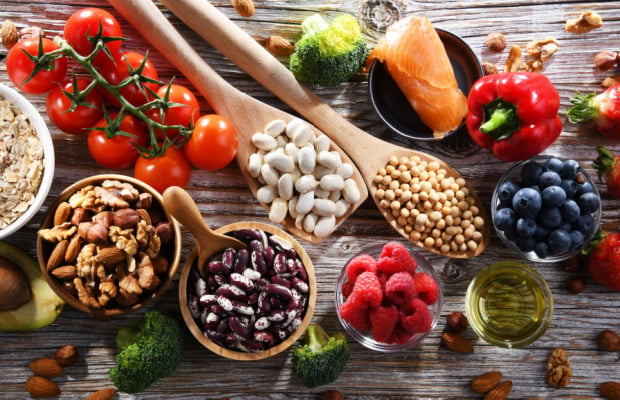Nuts are often a tempting snack, whether they’re nibbles at a party or as a handy go-to when you’re on the run.
They’re a nutrient-rich food containing fibre, protein, vitamins, minerals and other nutrients that could help reduce your risk of cardiovascular disease.
But you may have also heard that nuts contain a lot of fat and are high in calories.
And with an ever-growing range of nut butters, milks and bars, it can be confusing to know if all nutty products are a healthy choice.
Are nuts fattening?
While nuts are high in fat and contain some saturated fat, they mainly contain healthier ‘unsaturated fats’.
Unlike ‘saturated fat’, this type of fat does not raise cholesterol levels.
Walnuts are also a source of plant-based omega-3 fatty acids, which have been shown to reduce the risk of heart disease.
However, nuts are still high in calories, so it’s best to stick to the recommended portion size as part of your daily balanced diet if you’re trying to manage your weight, which is a small handful (30g) of nuts.
Take some out of the packet and put the rest away if you find it hard to stop eating them.
Depending on the type of nut, 30g can contain 180 to 225kcal.
Try to choose whole, plain nuts, as nuts with coatings like dry roasted or honey roasted nuts will add extra calories, sugar and saturated fat.
And avoid salted nuts, as too much salt can increase your risk of high blood pressure.
Is there protein in nuts?
Nuts are a good source of protein, with around 7g of protein per 30g portion of mixed nuts.
They can be a good way for people eating a plant-based diet to get more protein.
Enjoying them as a snack or adding them to meals can help you reach your daily recommended amount of protein.
For a healthy adult, this is 0.75g per kg of body weight – around 45g a day for a 60kg woman and 55g a day for a 75kg man.
Which are the healthiest nuts?
The amount of protein and saturated fat in different types of nuts can vary. If you eat a range of nuts, you’re most likely to benefit from all the different nutrients they can provide.
Here are the approximate nutritional values for different nuts per 100g:
How healthy are nut butters?
Nut butters like peanut butter and cashew butter are a spreadable paste made from grinding nuts. These days, there are many different types, and a large variation in price too.
The most important thing is whether they have any added ingredients, not the kind of nut they’re made from.
Look for the ones that contain only nuts, and come with no added salt, sugar or palm oil.
Even premium brands can have added extras that you might not expect, so check the ingredients list carefully, or look for ‘100% nuts’ on the label.
Try to choose one without added palm oil and coconut oil, as these are often added to nut butters and are high in saturated fat.
You may also see flavoured nut butters with additions like coconut, cocoa or maple syrup. These flavours increase the saturated fat, salt and sugar content, leaving less room for the nutritious nuts.
Once you’ve chosen your nut butter, keep an eye on portion size. Try to stick to 30g, which is 2 heaped teaspoons.
Is nut milk healthy?
While dairy-free drinks made from nuts are a popular plant-based option, they usually only contain a small amount of nuts – generally 2 to 6 per cent – so they’re lower in protein than cow’s milk.
If you’re using it as a dairy alternative, choose one with added calcium. And make sure it’s unsweetened to avoid extra sugar.
Are nut snack bars good for you?
Lots of on-the-go snack bars market themselves on their protein content, usually from the nuts they contain.
Make sure to check the ingredients and nutrition information.
These bars usually contain less healthy ingredients, including syrup, honey, chocolate, coconut and salt. A handful of unsalted nuts is usually a healthier choice
What to read next...










